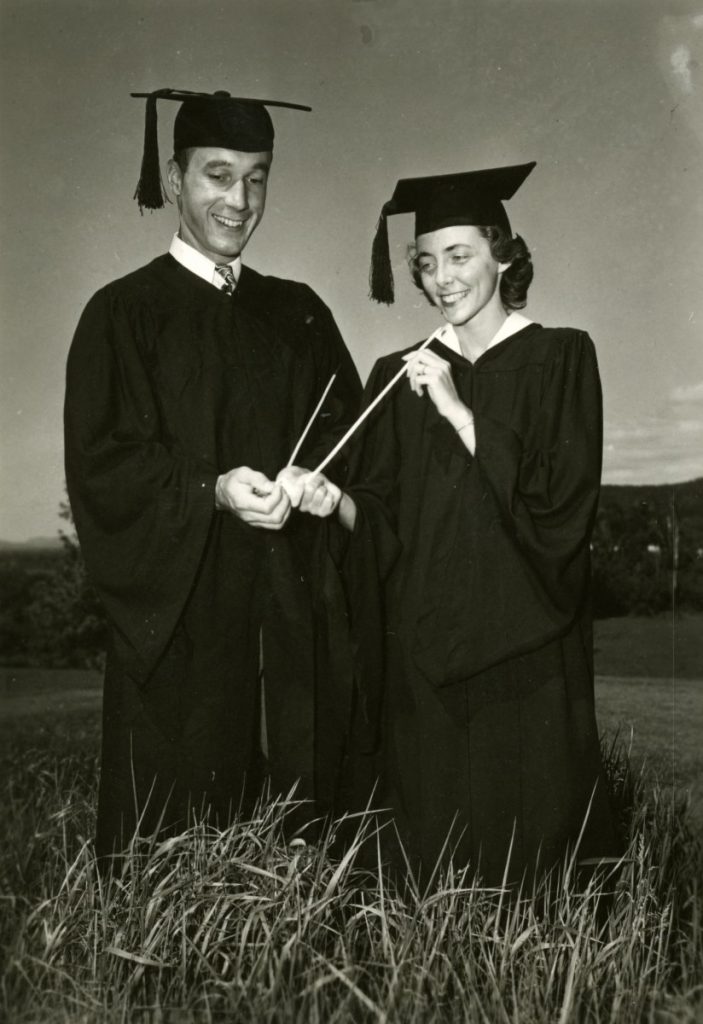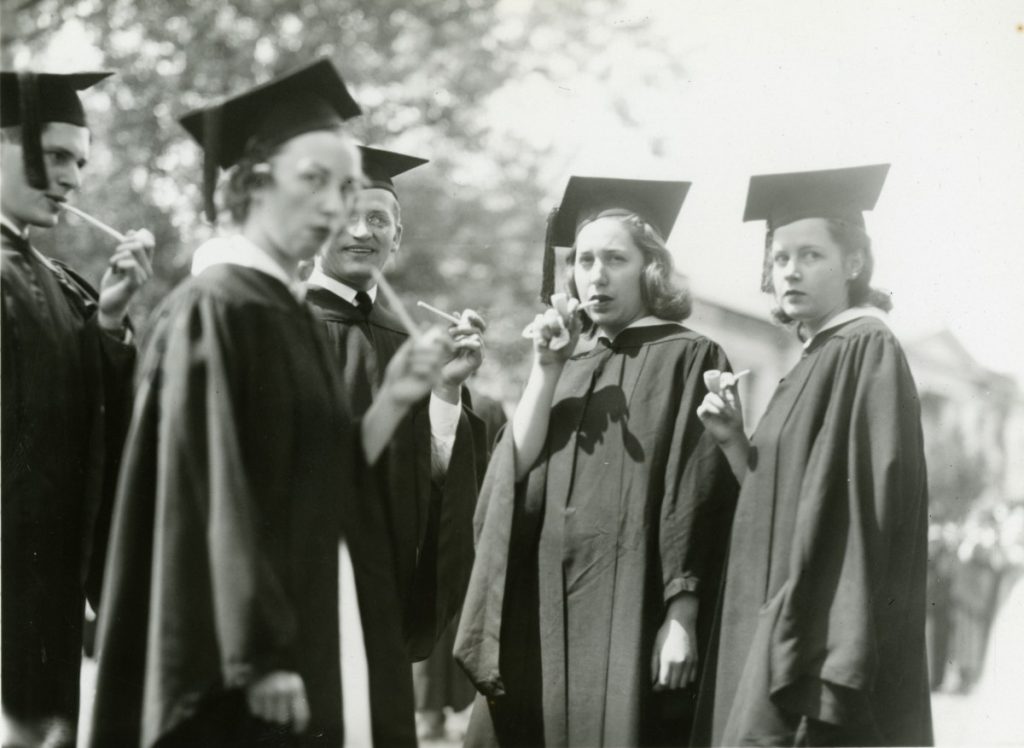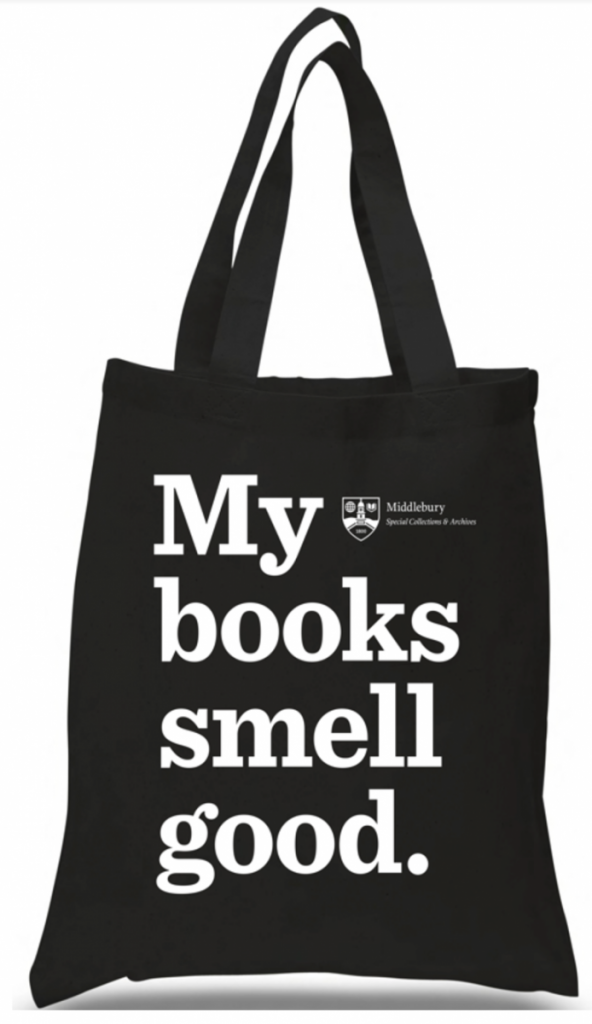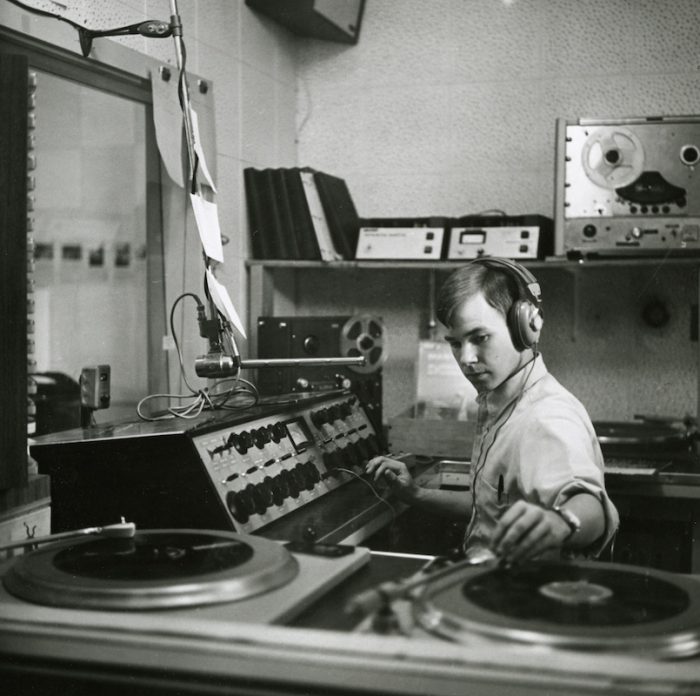Tag Archives: Special Collections
Military tanks move in. At Bread Loaf, 1941
Middlebury’s Bread Loaf campus is usually seen as a peaceful academic retreat nestled in the lush landscape of the Green Mountains, but 75 years ago, it was briefly home to a serious display of military might. College President Paul Moody (who had served in World War I and was a member of the National Guard) hosted the 754th Tank Battalion at the campus in the fall of 1941.
This compilation of footage from 16mm reels in the College archives are believed to show the visit, including a shot of a helmeted President Moody in one of the battalion’s vehicles (an unused title card on another reel in the archives reads: “Prexy Gets Tanked”). Other footage includes author and professor William Hazlett Upson with an unknown child dressed as a soldier, officers visiting the Middlebury Inn, and a procession of military vehicles through campus.
Lieutenant Colonel Robert J. Wallace thanked President Moody in a letter saying, “The quarters afforded us were excellent, and the party held for the Battalion at Bread Loaf by the girls of Middlebury College, will long be very pleasantly remembered by all the men of the Battalion.”
For more information or for permission to use this clip contact SpecialCollections@middlebury.edu. Compilation from original 16mm films in the Middlebury College Archives.
Ancient clay artifact meets the Future
Today in Special Collections, our oldest text faced the library’s newest technology.
Our cuneiform tablet, a beer token from 2,000 BCE, took a new form when DLA postdoctoral fellow Kristy Golubiewski-Davis captured it in a 3D scan.

To see 3D scanning in action – along with the tablet and other important Special Collections objects – come to Davis Family Library this Friday! Kristy will by demonstrating 3D scanning in the library atrium from 10am-2pm, and Special Collections will host our annual Fall Family Weekend Open House from 1pm-4pm.
And stay tuned for a 3D printout made from the scan coming soon, a plastic facsimile students and researchers can inspect in their own hands!
Stacks & Tracks, on the radio. Tune in.
Stacks & Tracks.
The Special Collections & Archives radio show.
We’re back.
From the bowels of the library basement come wonders like you’ve never seen. (And still can’t, because it’s radio.)
Wednesdays, 12p-1p
91.9FM | iTunes radio | listen online | on your phone
Visit us. Monday-Friday, 1-5p. You never need an appointment, or an excuse, to stop by.
Get out and vote like it’s 1924!
In honor of the Vermont primary tomorrow, we remember that every vote counts – even in a small town.
The tiny Vermont town of Somerset (which still exists!) could not be silenced despite losing 50% of their voting population in 1924. In one fell swoop, the town clerk, treasurer, tax collector, constable, and school director departed, leaving the other two legal voters the only residents eligible to cast their ballots.
Though the town currently boasts a similarly small population, we hope they, and all voting Vermonters, make it to the polls tomorrow!

One Giant Leap For Mankind, and for Special Collections (ArchivesSpace has landed.)
When astronauts Neil Armstrong and Buzz Aldrin took the first human steps on the moon on July 20, 1969, Armstrong famously uttered, “That’s one small step for man, one giant leap for mankind.”

Astronaut Buzz Aldrin on the moon, courtesy of NASA.
47 years later, Special Collections & Archives launched ArchivesSpace (go/aspace), a search tool that organizes the diverse and unique archival and manuscript collections stored in the Davis Family Library on the Lower Level. (If you want to be fancy about it, these are called Finding Aids, or inventories made by archivists to help navigate a collection.)
Learn more about ArchivesSpace here.
Search ArchivesSpace now, contact special collections to learn more, or visit us for a personal tour of ArchivesSpace and of our collections.
Graduation Traditions: Cane Ceremony
In the 1940s, a revival in interest in Gamaliel Painter, one of Middlebury’s founders and early benefactors, saw the birth of a new graduation tradition. During convocation ceremonies at Middlebury’s former Women’s College, graduates began passing down replicas of Painter’s cane to the junior class. Today, every Middlebury graduate receives such a replica to keep as a symbol of their alma mater and with which to tap along when “Gamaliel Painter’s Cane” is sung at reunion.
This compilation of 16mm film footage from the college archives shows the cane-passing ceremony as part of convocation processions in the 1940s held behind Forest Hall.
Find out more about the story of Painter’s cane and its place in Middlebury history in The Story of Middlebury’s Cane Tradition a video created by the College’s own Chris Spencer, Stephen Diehl, Benjamin Savard ’14, and Matthew Lennon ’13.
Graduation Traditions: Pipe Smoking

Just as coming across full page ads for Chesterfield cigarettes used to be part and parcel of reading the latest edition of The Campus, pipe smoking was once a traditional part of Middlebury’s graduation festivities. Dating back to at least the 1920s during the “Class Day” activities that preceded commencement, graduates would gather outside to take puffs on long white pipes (sometimes lit by proud parents) before heading off to the alumni barbecue.

This compilation of 16mm film footage from the College Archives captures the pipe smoking tradition from the late 1920s to mid-40s. Although even those graduates who coughed through the smoke appear to have had a swell time, the annual tradition eventually ended in what we can only assume was the interest of public health.

